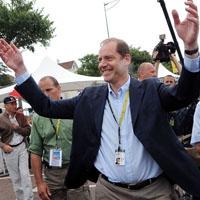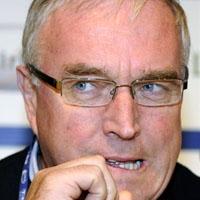
Recently on Cyclingnews.com |
Cyclingnews Editorial, November 10, 2008
The politics of anti-doping

|
The fight against doping has made great strides in recent years, but will the peace deal between the UCI and the ASO actually be a setback? David Walsh, chief sports writer for the Sunday Times and author of L. A. Confidentiel, L.A. Officiel and From Lance to Landis gives insight into the pros and cons of the politics of the anti-doping fight.
For those with a fondness for scepticism, Pierre Bordry's recently expressed view that "80 percent of the peloton is clean" could not pass unnoticed. It was an arresting utterance from the head of the French Anti-Doping Agency (AFLD) for many reasons. Bordry has had access to some of the evidence, he is antagonistic towards the UCI and its president Pat McQuaid, and, most importantly, he has no commercial motive for suggesting professional cycling is cleaner than it is. If it is true that 80 percent of the peloton is now drug-free, cycling has come a long way in a short time and has much to lose by any return to the ineffective controls of what might be called 'the Verbruggen era'.
In the same interview, Bordry also highlighted the danger of the UCI returning to the time when many riders cheated without much risk of detection. And if we take seriously Bordry's '80 percent', we must also respect his fear of regression. Perhaps as much as at any time in the recent past, cycling is at a crossroads and, perhaps strangely, concern about the future is not lessened by the rapprochement in the relationship between the UCI and the sport's biggest commercial partner, the Amaury Sports Organisation.
"Lets not delude ourselves that drug-free cycling begins in Spring of 2009. That won't happen."- David Walsh warns that the sport isn't cleaned up yet. |
First, it should be acknowledged there has been progress. Many professional teams have made honest efforts to combat doping and to make it less easy for their own riders to cheat. People like Jonathan Vaughters (Garmin-Chipotle), Jean-René Bernaudeau (Bouygues Telecom), Bob Stapleton (Columbia), Eric Boyer (Cofidis) and Marc Madiot (Française des Jeux) have embraced the challenge of changing cycling's culture and have helped make the sport cleaner. David Millar has deservedly regained the respect and affection he enjoyed at the beginning of his career and plenty of others have committed to riding drug-free. One day we may able to say to Christophe Bassons and all those who suffered for their sanity that it wasn't in vain.
But there is a tough road ahead and no certainty about which route the sport will travel. For any right-thinking cycling fan, the starting point must be that the clean rider is not disadvantaged. That is the key measure of fair competition and we haven't had it in cycling since God-knows-when. Perhaps, ever. Though there were signs that this year's Tour de France was less affected by doping than any of its immediate predecessors, it wasn't a clean race. Bordry and the French anti-doping agency brought that to our attention by catching some of those who used CERA, a newer and probably more efficient member of the erythropoietin family.
How can we be satisfied when five Tour stages were won by riders we now know were doping; when the rider who finished third overall and won the King of the Mountains also doped and when it is highly likely that others doped and were not caught? Of course we cannot be satisfied, but against the depressing reality that some continue to dope regardless of the damage to the sport and the chances of detection, progress is being made and should be acknowledged.
For example, the CERA positives might not have been discovered without the co-operation between the manufacturers of the drug and the world's anti-doping authority, WADA. How badly we have needed that over the last two decades and, up to now, how badly sport has been served by a pharmaceutical industry happy to profit from the misuse of its products. It should also be said that the UCI's anti-doping chief, Anne Gripper, remains a credible figure in the fight and the world body's athlete passport programme offers the promise of another layer of protection to the sport and those wishing to compete clean.
"What is wrong with belatedly penalising the man who cheated? Would it be unfair to then sanction him?"- David Walsh wonders what is wrong with retroactive testing? |
But let us not delude ourselves that drug-free cycling begins in the Spring of 2009. That won't happen. Furthermore, it isn't often acknowledged but it is undeniable that the higher the percentage of clean riders, the greater the potential rewards for dopers. Blood-boosting drugs and transfusions work well in normal times, but would be devastatingly effective when you and three others were the only ones in the race hitched to an outboard motor. This is why WADA, the UCI and all of the national governing bodies must remain innovative, aggressive and unrelenting in their commitment to drug-free competition.
And it is why one worries. After the farcical outcome to the 2006 Tour de France and the sustained farce of the following year's race, those running the sport realised something had to be done. How could anyone trust cycling when the principal stakeholders didn't trust each other? The Rasmussen Affair was the last straw for the ASO and organisers of other races – they wanted to have nothing to do with the world governing body. It wasn't just the UCI's credibility that was damaged, its status as the big player in the sport was undermined and when ASO said it would dissociate from the governing body, there was the possibility of the wound being fatal.
From the hostility and tension of the ASO-UCI relationship came an energy we had not previously seen in the fight against doping. From the ASO side, Christian Prudhomme spoke endlessly and with fervour about the need for change; formed relationships with those most committed to a new order and the Tour's new race director gave us the sense that the Tour was determined to go for broke. The refusal to grant Astana a place in this year's edition was the decision that epitomised the changed mood and even those still sceptical had a sense that, at last, the bad guys were about to get a run for their money.
Not surprisingly, the UCI was feeling the heat and that played to Gripper's natural enthusiasm for the anti-doping fight. Last year, we cheered when she spoke about UCI's pursuit of "the men in black" and agreed that, at last, the organisation had found someone with the stomach for exposing big-name cheats. This year, the UCI matched the French by targeting Emanuele Sella and found him positive for CERA. For a while, there was a war within a war as the UCI scrambled to be as aggressively anti-doping as the big-race organisers and the cheats were on the run.

|
Are they still on the run? Time will tell, because the mood has changed. The UCI and ASO have put to one side what seemed irreconcilable differences and they now want us to understand they actually love each other. A year or so ago, senior figures in the Tour de France organisation were scathing in their dismissal of Pat McQuaid and took some delight in referring to him as "the ventriloquist", a nickname founded in the belief that he was merely a mouthpiece for the former president, Hein Verbruggen. At last month's presentation of the 2009 Tour route, McQuaid was welcomed by ASO big-wigs like some long-lost brother.
But shouldn't the restoration of cordiality help to coalesce and improve cycling's anti-doping effort? Don't bet on it. Hardly was the UCI back in bed with the ASO but McQuaid was showing a distinct lack of enthusiasm for retroactive testing. Belated positive tests would, he demurred, mean re-jigging results. Perhaps I am missing something here but what is wrong with belatedly penalising the man who cheated? Would it be unfair to then sanction him? Has the statute of limitations been reduced to three weeks? And, by the way, wouldn't it be good to be able to move the clean rider up into his proper finishing position?
The UCI president wasn't in favour of re-testing samples from this year's Giro d'Italia even though there were good reasons for believing at least some of the more prominent riders in the race were using CERA. Doesn't Alberto Contador deserve to see all of those Giro samples re-tested, so that it can be shown he wasn't one of the riders using the product? Just in case there was doubt. And if there are guys who won stages of the race using CERA, wouldn't it be good to get the prize money back? The best reason, though, for re-testing is the deterrent effect: what cheat likes the idea of being exposed two, three, five or even six years after apparently getting away with his offence? The guy who dopes deserves to have that sword of Damocles hanging over him.
And herein is the fear concerning the new cosiness in the relationship between UCI and ASO. A year ago Prudhomme would not have stood idly by as McQuaid displayed his lack of enthusiasm for retroactive testing. And, now, in this less rancorous UCI-ASO world, what do you imagine Monsieur Prudhomme would say if Monsieur Bordry called up and said, "Bonjour Christian, I am sure we now have a foolproof test for autologous blood transfusions, do you want us to re-test samples from the Tours of 2004, 2005, 2006, 2007 and 2008?"
Sadly, I'm no longer sure of the answer either.
